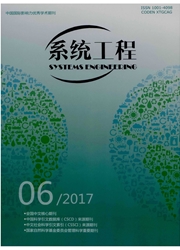

 中文摘要:
中文摘要:
根据"坚持以人为本,全面、协调、可持续的发展观"的科学发展观的内涵构僵了社会综合评价指标体系。用客观赋权和主观赋权的组合确定指标最优权重,建立基于科学发展观的社会综合评价模型,并对十五期间中国的社会状况进行实证分析。本文的创新与特色一是通过将可观测的国民幸福指数纳入评价体系,反映人们对自身生存和发展状况的感受和体验,改变了现有评价没有考虑人民幸福程度的缺点。二是通过以人为本和可持续发展的评价思路,反映科学发展观以人为本和全面协调可持续的基本要求。三是通过人口自然增长率和居民消费价格指数等适中和最佳区间型指标的设定,解决了现有社会评价中片面认为这些指标越大越好或越小越好的不合理问题。四是通过客观赋权和主观赋权的组合确定止标最优权重,避免了客观赋权法无法反映专家经验、或主观赋权法无法反映客观条件变化的双重弊端。
 英文摘要:
英文摘要:
According to the connotation of insisting on human-oriented,comprehensive,coordinated and sustainable development,this paper constructs a comprehensive evaluation index system of society,determines the optimal weights of indicators by combining approximation ideal point method with G1 method optimally,and then establishes a comprehensive evaluation model of Chinese society,lastly empirically analyzes the development of Chinese society during the 10th FiveYear Plan.The contribution of this paper lies in four aspects.Firstly,The incorporation Gross National Happiness into the evaluation system fully reflects people's own feelings of and experience in the survival and development,which overcomes the limitations of ignoring people's happiness feeling in existing research.Secondly,the idea of people-oriented and sustainable development put forward in this paper reflects the essence of scientific development concept which requires people-oriented and sustainable development.Thirdly,The determination the ideal value standards of moderate indicators such as population growth rate and consumer price index solves the irrational problems in existing evaluation method which supports that the bigger these indicators are,the better and vice versa.Fourthly,objective weight is combined with subjective weight to determine optimal weight,which avoids the two disadvantages of objective weight,which can not reflect expert experience and subjective weight,which can not reflect the change of objective conditions.
 同期刊论文项目
同期刊论文项目
 同项目期刊论文
同项目期刊论文
 期刊信息
期刊信息
